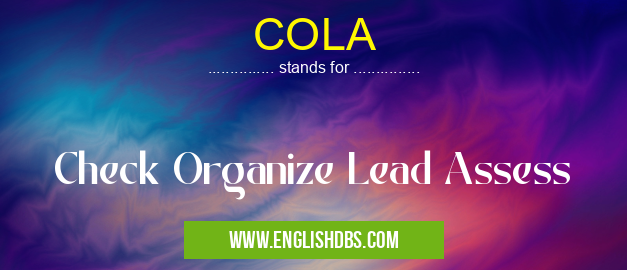What does COLA mean in UNCLASSIFIED
COLA is an acronym that stands for Check, Organize, Lead, and Assess. It is a process that can be used in a variety of settings, including the workplace, school, and home.

COLA meaning in Unclassified in Miscellaneous
COLA mostly used in an acronym Unclassified in Category Miscellaneous that means Check Organize Lead Assess
Shorthand: COLA,
Full Form: Check Organize Lead Assess
For more information of "Check Organize Lead Assess", see the section below.
COLA Steps
- Check: The first step is to check the current situation. This involves gathering information and assessing the current state of affairs.
- Organize: Once the current situation has been checked, it is important to organize the information and develop a plan. This plan should outline the steps that need to be taken to achieve the desired outcome.
- Lead: The third step is to lead the team or group in implementing the plan. This involves providing direction, motivation, and support.
- Assess: The final step is to assess the results of the plan. This involves evaluating the progress that has been made and making any necessary adjustments.
Benefits of COLA
There are many benefits to using the COLA process, including:
- Improved efficiency
- Increased productivity
- Enhanced teamwork
- Greater accountability
- More effective decision-making
Essential Questions and Answers on Check Organize Lead Assess in "MISCELLANEOUS»UNFILED"
What is COLA?
COLA stands for Check, Organize, Lead, and Assess. It is a framework used in project management to ensure that tasks are completed effectively and efficiently.
How can I use the COLA framework?
To use the COLA framework, follow these steps:
- Check: Determine the project's goals, scope, and constraints.
- Organize: Break down the project into smaller tasks and assign responsibilities.
- Lead: Provide clear direction and support to team members.
- Assess: Monitor progress regularly and make adjustments as needed.
What are the benefits of using the COLA framework?
The benefits of using the COLA framework include:
- Improved project planning and execution.
- Increased team collaboration and communication.
- Enhanced risk management.
- Better project outcomes and deliverables.
Who can benefit from using the COLA framework?
The COLA framework can be beneficial for project managers, team members, and organizations of all sizes. It is particularly useful for projects that are complex, have multiple stakeholders, or require a high level of coordination.
Is the COLA framework suitable for all types of projects?
While the COLA framework is versatile and applicable to a wide range of projects, it may not be suitable for all types. It is most effective for projects that are well-defined, have a clear scope, and involve multiple team members.
What are some limitations of the COLA framework?
Some limitations of the COLA framework include:
- It can be time-consuming to implement, especially for large or complex projects.
- It requires a high level of discipline and commitment from team members.
- It may not be suitable for projects with a high level of uncertainty or rapidly changing requirements.
Are there any alternatives to the COLA framework?
Yes, there are several alternatives to the COLA framework, including:
- PRINCE2
- Agile project management
- Waterfall project management
- Lean project management
Final Words: The COLA process is a valuable tool that can be used to improve the efficiency and effectiveness of any organization. By following the four steps of COLA, you can achieve your desired outcomes and improve your overall performance.
